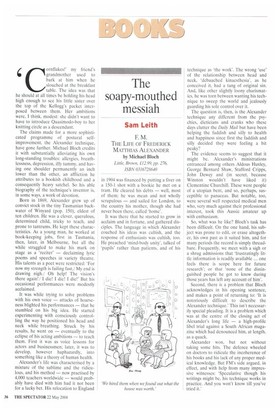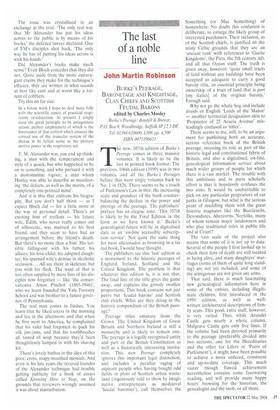The soapy-mouthed messiah
Sam Leith
EM. THE LIFE OF FREDERICK MATTHIAS ALEXANDER by Michael Bloch Little, Brown, f12.99, pp. 276, ISBN 0316728640 C ornflakes!' my friend's
grandmother used to bark at him when he slouched at the breakfast table. The idea was that he should at all times be holding his head high enough to see his little sister over the top of the Kellogg's packet interposed between them. Her ambitions were, I think, modest: she didn't want to have to introduce Quasimodo-boy to her knitting circle as a descendant.
The claims made for a more sophisticated programme of postural selfimprovement, the Alexander technique, have gone further. Michael Bloch credits it with substantially alleviating his own long-standing troubles: allergies, breathlessness, depression, iffy tummy, and having one shoulder permanently an inch lower than the other, an affliction he attributes to a bookish childhood and a consequently heavy satchel. So his able biography of the technique's inventor is, in some ways, a work of devotion.
Born in 1869, Alexander grew up of convict stock in the tiny Tasmanian backwater of Winyard (pop. 150), eldest of ten children. He was a clever, querulous, determined child, tricky to teach, and prone to tantrums. He kept these characteristics. As a young man, he worked at book-keeping jobs, first in Tasmania, then, later, in Melbourne, but all the while struggled to make his mark on stage as a 'reciter' — declaiming lyric poems and speeches in variety theatre. His talents as a poet were restricted: `For now my strength is failing fast,/ My end is drawing nigh./ Oh help! The vision's there again!! I die! I die! I die!' But his occasional performances were modestly acclaimed.
It was while trying to solve problems with his own voice — attacks of hoarseness blighted his performances — that he stumbled on his big idea. He started experimenting with consciously controlling the way he positioned his head and neck while breathing. Struck by his results, he went on — eventually to the eclipse of his acting ambitions — to teach them. First it was as voice lessons for actors and businessmen; later, it was to develop, however haphazardly, into something like a theory of human health.
Alexander's life was characterised by a mixture of the sublime and the ridiculous, and his method — now practised by 4,000 teachers worldwide — would probably have died with him had it not been for a lucky bet. His relocation to England in 1904 was financed by putting a fiver on a 150-1 shot with a bookie he met on a tram. He cleared his debts — well, most of them; he was mean and not wholly scrupulous — and sailed for London, to the country his mother, though she had never been there, called 'home'.
It was there that he started to grow in acclaim and in fortune, and gathered disciples. The language in which Alexander couched his ideas was cultish, and the response of enthusiasts was cultish, too. He preached 'mind-body unity', talked of 'pupils' rather than patients, and of his technique as 'the work'. The wrong 'use' of the relationship between head and neck, 'debauched kinaesthesia', as he conceived it, had a tang of original sin. And, like other slightly loony charismatics, he was torn between wanting his technique to sweep the world and jealously guarding his sole control over it.
The question is, then, is the Alexander technique any different from the psychics, dieticians and cranks who these days clutter the Daily Mail but have been helping the faddish and silly to health and happiness since first the faddish and silly decided they were feeling a bit peaky?
The evidence seems to suggest that it might be. Alexander's ministrations entranced among others Aldous Huxley, George Bernard Shaw, Stafford Cripps, John Dewey and (in secret, because Winston wouldn't have liked it) Clementine Churchill. These were people of a utopian bent, and so, perhaps, susceptible to panaceas. But notable, too, were several well respected medical men who, very much against their professional interest, took this Aussie amateur up with enthusiasm.
So, what was he like? Bloch's task has been difficult. On the one hand, his subject was prone to edit, or erase altogether, his own past as it suited him, and for many periods the record is simply threadbare. Frequently, we meet with a sigh or a shrug admissions that 'frustratingly little information is readily available • „ one feels there is scope here for future research'; or that 'none of the distinguished people he got to know during those years has left any account of him'.
Second, there is a problem that Bloch acknowledges in his opening sentence, and makes a point of returning to: 'It is notoriously difficult to describe the Alexander technique.' This isn't necessarily special pleading. It is a problem which was at the centre of the closing act of Alexander's long life — a high-profile libel trial against a South African magazine which had denounced him, at length, as a quack.
Alexander won, but not without taking some hits. The defence wheeled on doctors to ridicule the incoherence of his books and his lack of any proper medical knowledge. But FM's side argued, in effect, and with help from many impressive witnesses: 'Speculative though his writings might be, his technique works in practice. And you won't know till you've tried it.' The issue was crystallised in an exchange at the trial. 'The only real way that Mr Alexander has put his ideas across to the public is by means of his books,' the defence lawyer declared. One of FM's disciples shot back, 'The only way he has of putting his ideas across is with his hands.'
Did Alexander's books make much sense? Even Bloch concedes that they did not. Quite aside from the more extravagant claims they make for the technique's efficacy, they are written in what sounds at best like cant and at worst like a torrent of cobblers.
Try this on for size:
In a future work I hope to deal more fully with the scientific aspect of practical respiratory re-education. At present I simply state the great principle to be antagonistic action, perfect employment of which is the forerunner of that control which ensures the correct use of the muscular system of the thorax in its fullest sense as the primary motive power in the respiratory act.
F. M. Alexander was, you end up thinking, a man with the temperament and style of a quack, but who happened to be on to something, and who pursued it with a monomaniac vigour; a man whom Huxley was able to describe as manifesting 'the defects, as well as the merits, of a completely one-pointed mind'.
And it is this that enlivens his biography. But you don't half thirst — as I expect Bloch did — for a little more in the way of personal detail. There's an exciting hint of troilism — his future wife, Edith, who never really comes out of silhouette, was married to his best friend, and they seem to have had an arrangement before the friend's death. But there's no more than a hint. His terrible falling-out with his father; his affairs; his love-child; his adopted daughter: his spurned wife's demise in alcoholic seclusion ... All are there in skeleton, but you wish for flesh. The want of that is too often supplied by mere lists of his disciples now forgotten — like 'the conservationist Amos Pinchot (1865-1946)', who we learn founded the Yale Forestry School and was brother to a future governor of Pennsylvania. The real man comes in flashes. You learn that he liked cocoa in the morning and tea in the afternoon; and that when he first went to America, he complained that his valet had forgotten to pack his silk jim-jams, and that his toothbrushes all tasted of soap because they'd been thoughtlessly lumped in with his shaving kit.
There's lovely bathos in the idea of this poor, cross, soapy-mouthed messiah. And even in his late years the revered founder of the Alexander technique had trouble getting publicity for a book of essays called Knowing How to Stop, on the grounds that reviewers wrongly assumed it was about masturbation.



















































































 Previous page
Previous page